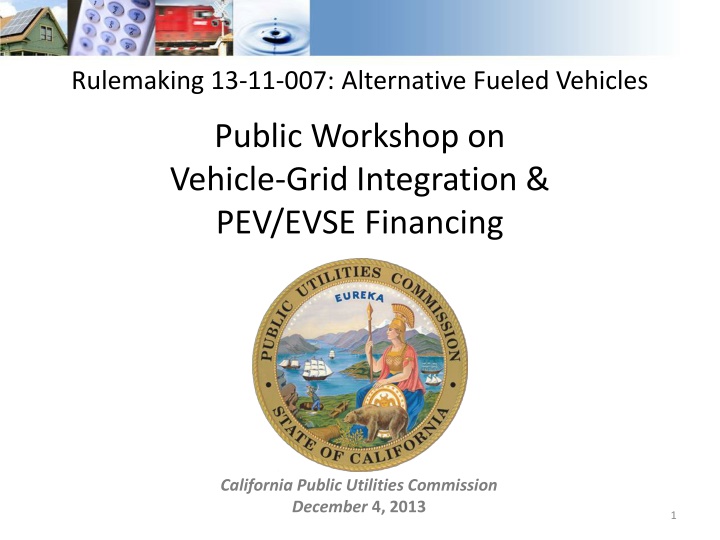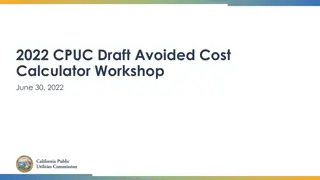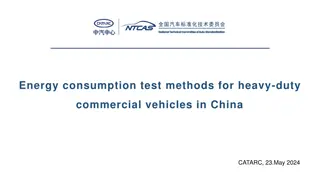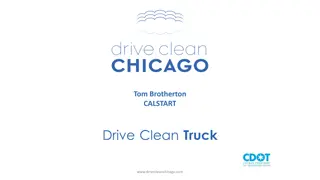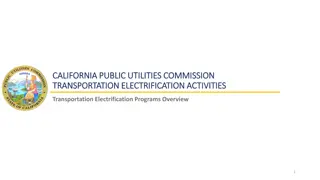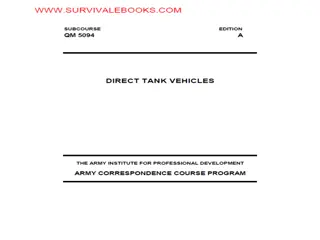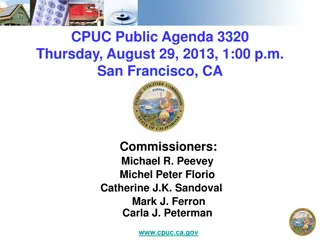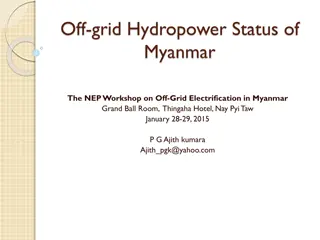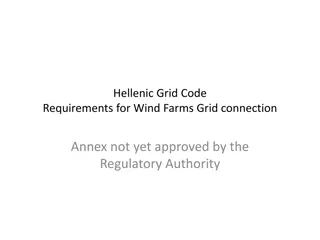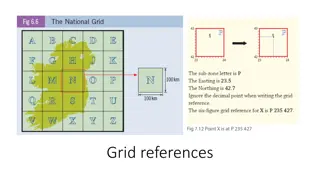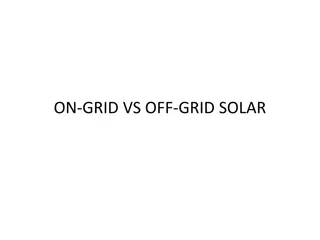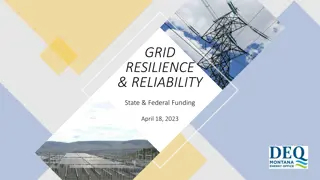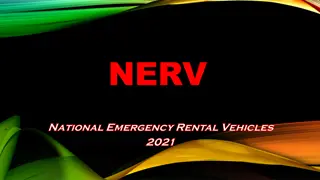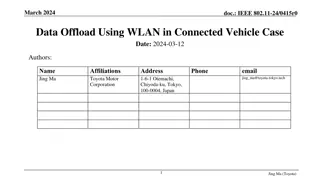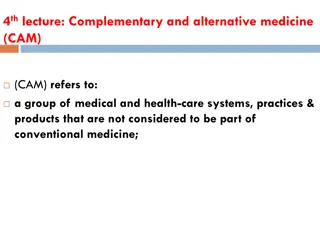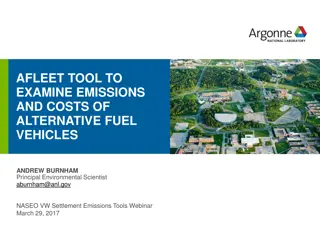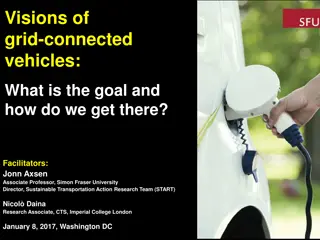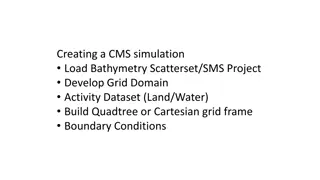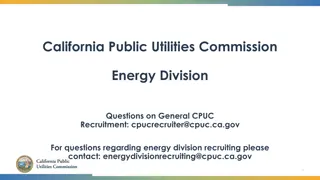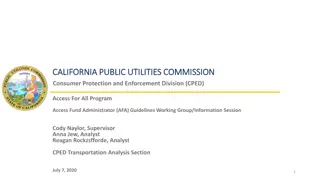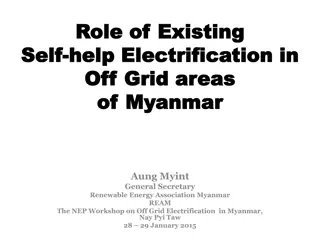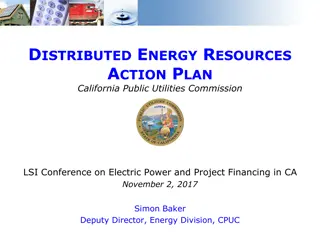Integrating Alternative-Fueled Vehicles with the Grid: CPUC Workshop Insights
Explore the CPUC workshop on Vehicle-Grid Integration and PEV/EVSE financing, focusing on the regulatory aspects and potential applications in grid services and energy markets. Key discussions include infrastructure financing, operational flexibility, and resource aggregation for bidirectional power flow.
Download Presentation

Please find below an Image/Link to download the presentation.
The content on the website is provided AS IS for your information and personal use only. It may not be sold, licensed, or shared on other websites without obtaining consent from the author.If you encounter any issues during the download, it is possible that the publisher has removed the file from their server.
You are allowed to download the files provided on this website for personal or commercial use, subject to the condition that they are used lawfully. All files are the property of their respective owners.
The content on the website is provided AS IS for your information and personal use only. It may not be sold, licensed, or shared on other websites without obtaining consent from the author.
E N D
Presentation Transcript
Rulemaking 13-11-007: Alternative Fueled Vehicles Public Workshop on Vehicle-Grid Integration & PEV/EVSE Financing California Public Utilities Commission December 4, 2013 1
Agenda Commissioner Peterman (Opening Remarks) Vehicle Grid Integration Panel Opening Presentation Discuss Question 1 Break Discuss Questions 2 & 3 Lunch Vehicle Cost Financing Break Infrastructure Installation Financing Wrap-Up and Next Steps 2
New CPUC Rulemaking Rulemaking on Alternative-Fueled Vehicles, instituted November 14, 2013. Two concurrent tracks Vehicle-Grid Integration Energy Division White Paper Rate Revisions and Financing Opportunities Rate Design Upfront vehicle costs Infrastructure installation 3
Vehicle-Grid Integration Overview: Adam Langton, CPUC Panelists: Ed Kjaer, SCE Richard Lowenthal, Chargepoint Peter Klauer, CAISO 4
The Opportunity Low Utilization Rate Operational Flexibility Embedded Technology
Potential Applications as Grid Storage Wholesale Market Services Distribution Infrastructure Services Customer-Facing Services Frequency Regulation Upgrade Deferral Power Quality Spin/Non-Spinning Reserves Voltage Support Power Reliability Load Following/Ramping Retail Energy Time-Shift Demand Charge Mitigation 6
Resource Aggregation 300 264 250 200 Minimum EVSE (n) 152 150 132 100 76 76 50 38 27 14 14 7 6 3 0 1.9 kW 3.3 kW 6.6 kW 19.2 kW 36 kW 90 kW Level 1 Level 2 Level 1 Level 2 AC Charging DC Charging Unidirectional Power Flow Bidirectional Power Flow
Framework for VGI Fragmented Actors Unified Actors 11
Primary Secondary Regulatory Questions Regulatory Questions How and Where is the Resource defined? What is the utility role in aggregating resources? How do utilities capture distribution benefits? How should competing grid signals be prioritized? Interconnection Wholesale Market Products Utility Tariffs Metering and Telemetry Communication Standards 12
Inter-Agency Roadmap Approach CPUC & CAISO Requirements for Tariffs & Products What is VGI? Why is it important? Commercial Deployment of Use Case Barriers to Address Needed Solutions 1 Design, Metering, Communications, Interconnection Values for Compensation Establish VGI Use Cases 2 Regulatory Aggregators Role Revision Prioritize VGI Use Case Implementation by Value of Grid Application 3 Application Primacy Revision Resource Definition 4 Developed & Demonstrated V2G Products Technological Revision Determine Impact, Value, and Market Potential of Applications
Discussion Questions Is the VGI Use Case Framework adequate? How do we prioritize future State VGI activities? Does the Energy Division White Paper capture all of the regulatory barriers related to CPUC jurisdiction? Are the four regulatory questions the right areas of focus for this proceeding?
Discussion Question 1 Is the VGI Use Case Framework adequate? How should the State prioritize implementation? Should we first implement the use cases that are feasible from a regulatory standpoint, and subsequently pursue more complex Use Cases? Does sequencing Use Cases make sense from a technology commercialization standpoint? How should we design initial policies so that they re ready for subsequent Use Cases?
Discussion Question 2 Does the Energy Division White Paper capture all of the regulatory barriers related to CPUC jurisdiction? If not, what additional barriers exist? Safety Interconnection Wholesale Products Utility Tariffs Metering & Telemetry Communication Standards Resource Definition Resource Aggregation Utility Capture/Return of Distribution Benefits Primacy of wholesale & retail grid services
Discussion Question 3 Are the four regulatory questions the right areas of focus for this proceeding? What other issues or proceedings implicate vehicle-grid integration?
The Utility Roles In Addressing Up-Front Vehicle Costs Moderator: Noel Crisostomo, CPUC Presenters: Snuller Price, E3 Adam Langton, CPUC Respondents: Alex Keros, GM Aaron Johnson, PG&E 20
The Utility Roles In Addressing EV Infrastructure Installation Costs Moderator: Damon Franz, CPUC Presenters: Mark Duvall, EPRI Greg Haddow, SDG&E 21
Wrap Up and Next Steps R.13-11-007 Schedule (see p. 26 of OIR) Event Date Voted on at Commission Meeting / Filed November 14, 2013 Date of Issuance November 22, 2013 Opening Comments Due December 13, 2013 Reply Comments Due December 20, 2013 Interagency VGI Roadmap (see ZEV Action Plan) Event Date Submit additional comments to CEC ASAP Publish Final Roadmap (Living 1st Version) to G.O. December 30, 2013 What additional activities? 22
